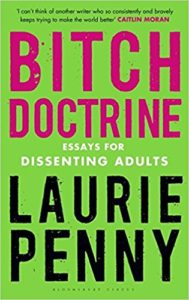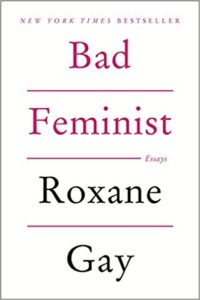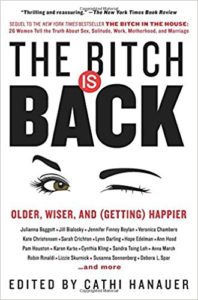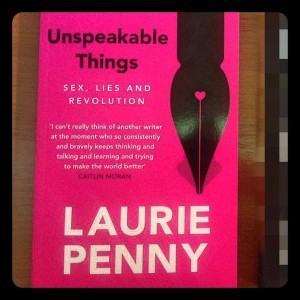Of Bitches
 11 October 2017 is International Girl Child’s Day, declared by the United Nations. The idea is to raise awareness of issues facing girls internationally surrounding education, nutrition, child marriage, legal and medical rights. The celebration of the day also “reflects the successful emergence of girls and young women as a distinct cohort in development policy, programming, campaigning and research.”
11 October 2017 is International Girl Child’s Day, declared by the United Nations. The idea is to raise awareness of issues facing girls internationally surrounding education, nutrition, child marriage, legal and medical rights. The celebration of the day also “reflects the successful emergence of girls and young women as a distinct cohort in development policy, programming, campaigning and research.”
 But what happens when the young woman gains consciousness in a world where many of the structures are still very patriarchal; they inform and dictate many relationships and policies. Feminism, particularly women’s movements, of the 1960s onwards have influenced young girls world over. Women learned how to express themselves in a manner that enabled them to be heard. Slowly and steadily the impact was discernible in different spheres. In publishing too for the first time women’s presses were being set up. Virago and Kali for Women were established. The magazine Ms was launched by Gloria Steinem. Women in Publishing was established at this time by Liz Calder, one of the co-founders of Bloomsbury. In India for the first time Status of Women Report ( 1975) was released. There was definitely a shift in perceptions and constructive action was being taken. Soon publishers worldwide recognised the growing importance of giving a space in their lists to women’s books — either by women or for women. In living memory there has been a dramatic shift with now there being more and more women authors being published.
But what happens when the young woman gains consciousness in a world where many of the structures are still very patriarchal; they inform and dictate many relationships and policies. Feminism, particularly women’s movements, of the 1960s onwards have influenced young girls world over. Women learned how to express themselves in a manner that enabled them to be heard. Slowly and steadily the impact was discernible in different spheres. In publishing too for the first time women’s presses were being set up. Virago and Kali for Women were established. The magazine Ms was launched by Gloria Steinem. Women in Publishing was established at this time by Liz Calder, one of the co-founders of Bloomsbury. In India for the first time Status of Women Report ( 1975) was released. There was definitely a shift in perceptions and constructive action was being taken. Soon publishers worldwide recognised the growing importance of giving a space in their lists to women’s books — either by women or for women. In living memory there has been a dramatic shift with now there being more and more women authors being published.
 In this context there are three collections of essays that I read recently — Bad Feminist ( Roxane Gay), Bitch Doctrine: Essays for Dissenting Adults ( Laurie Penny) and The Bitch is Back ( ed. Cathi Hanauer). These three books can be yoked together not only for their feminism but also that they mark the manner in which the feminists conduct themselves, the choices they make and how they evolve as individuals. Some of the older feminists as those sharing their experiences in their essays included in The Bitch is Back comment upon living their feminism by negotiating their spaces regularly and thereafter making peace with the decisions made. The common thread running through all these essays is how challenging at times it can be to find the same sense of equality and entitlement that men of diverse backgrounds seem to have in all societies. Women have to negotiate their spaces and stand by their choices, at times it is not easy, but feminism has granted this at least — the space to negotiate and as some of the older women discover it is also about making peace with having your own identity. There are two particularly fine essays that encapsulate and address many of these issues in The Bitch is Back — “Trading Places: We both wanted to stay home. He won. But so did I.” by Julianna Baggott and “Beyond the Myth of Co-Parenting: What we lost — and gained — by abandoning equality” by Hope Edelman.
In this context there are three collections of essays that I read recently — Bad Feminist ( Roxane Gay), Bitch Doctrine: Essays for Dissenting Adults ( Laurie Penny) and The Bitch is Back ( ed. Cathi Hanauer). These three books can be yoked together not only for their feminism but also that they mark the manner in which the feminists conduct themselves, the choices they make and how they evolve as individuals. Some of the older feminists as those sharing their experiences in their essays included in The Bitch is Back comment upon living their feminism by negotiating their spaces regularly and thereafter making peace with the decisions made. The common thread running through all these essays is how challenging at times it can be to find the same sense of equality and entitlement that men of diverse backgrounds seem to have in all societies. Women have to negotiate their spaces and stand by their choices, at times it is not easy, but feminism has granted this at least — the space to negotiate and as some of the older women discover it is also about making peace with having your own identity. There are two particularly fine essays that encapsulate and address many of these issues in The Bitch is Back — “Trading Places: We both wanted to stay home. He won. But so did I.” by Julianna Baggott and “Beyond the Myth of Co-Parenting: What we lost — and gained — by abandoning equality” by Hope Edelman.
These books are meant for everyone and not necessarily for feminists. Read them. Discuss them. Share them and not just with the girls in your circle as they come of age. It is a way of seeing. Hopefully reading about alternative gendered perspectives will enable a healthy debate in society and contribute to the transformation of traditional patriarchal structures of thinking.
11 October 2017


